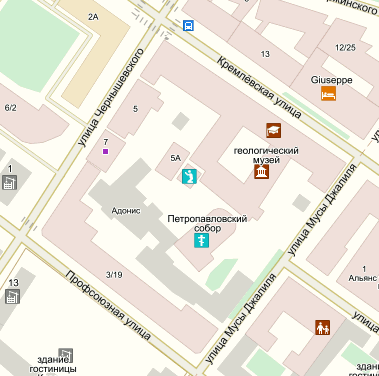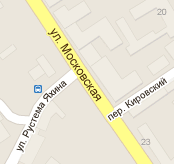Categories: "Geography"
Улица
The Russian word for ‘street’ is улица, which has got to be related somehow to улитка ‘snail,’ but I haven't figured out a way to connect them in an engaging fashion. It is declined like this.
| Sg | Pl | |
| Nom | улица | улицы |
| Acc | улицу | |
| Gen | улицы | улиц |
| Pre | улице | улицах |
| Dat | улицам | |
| Ins | улицей | улицами |
Both Russian streets and American streets can be named after people. So in the US you can have Washington Street or Lincoln Street Street. In Russian when you name a street after someone, the name goes in the genitive case and comes after the word улица. You don't normally capitalize улица, except of course at the beginning of the sentence.
| Где улица Баумана? | Where is Bauman street? |
| Поверните налево на улице Пушкина. | Turn left on Pushkin Street. |
| Как доехать до улицы Михаила Миля? | How do you get to Mikahil Mil street? |
Note that when you translate the street into English, the name must be transliterated from the nominative form, not the genitive form.
Many Russian last names resemble adjectives in form, like Достоевский or Толстой. They must decline like adjectives.
| Как пройти к улице Достоевского? | How do you get to Dostoevski Street? |
| Улица Толстого сегодня закрыта. | Tolstoy Street is closed today. |
Now, what if the name of the street isn't a person's name, say, something like Trade Union Street or Kremlin Street? Then there are a couple of ways to go about it. The first way is to turn the noun into an adjective and put it in front of the noun; of course, the adjective agrees with the noun in gender, number and case.
| Где Профсоюзная улица? | Where is Trade Union Street? |
| Геологический музей находится на Кремлёвской улице. | The geology museum is located on Kremlin Street. |

(BTW, I currently really like the map at zurbarzar.ru, and I also love the program 2гис for both maps and linking with reviews.)
Sometimes the adjective will come after the noun, and it will still agree with the noun.
| — Где улица Москвовская? — Что за дурацкий вопрос. Вы на улице Московской и стоите! |
“Where is Moscow Street?” “What a stupid question. You’re standing on Moscow Street!” |

I seem to notice a tendency on internet maps to put the «ул.» in front of the adjective; Google maps seems to have made that editorial decision. However in speech the Russians seem to accept the adjective either before or after the noun... at least I haven't been corrected so far.
Искусство
The word искусство means art. It declines like this:
| Sg | Pl | |
| Nom | искусство | искусства |
| Acc | искусство | |
| Gen | искусства | искусств |
| Pre | искусстве | искусствах |
| Dat | искусству | искусствам |
| Ins | искусством | искусствами |
| Мне нравится искусство. | I like art. |
| В искусстве нет больше ничего оригиналього. | There is no original art anymore. |
| Полюбуйся искусством. | Enjoy the art. |
| Он рассказал о своем искусстве. | He talked about his artwork. |
Art can be the representation of the imagination, expression of the emotion, or recording or a memory, that is usually tangible visual or audial. There are many styles of art from drawings, sculptures, photography to dancing and music. All of these are expressions of the artists that they want to share in their own way. Art has a plethora of genres, from realism and surrealism to geographical art or abstract. Art has many different eras: Renaissance, Classical, Romantic, Contemporary and Modern. Art varies in style from country to region down to the individual. Art can help distress a person or simply let them positively express their creativity.
In 1757 Ivan Shuvalov created the Russian Academy of Arts then known as the Academy of the three noble arts. The focus was on neoclassical styles and prepared its students for furthering their education in European schools. As of 1947 the head office is in Moscow. One of the most recognized art traditions that come from Russia are the Matryoshka dolls. Those are also referred to as Russian nested dolls. They are the small wooden dolls that open from the middle horizontally which have inside of most of them are a smaller doll until they get to the smallest one. Vasily Zvyozdochkin carved the first Russian Matryoshka set in 1890 from a design by Sergey Malyutin.

Море
The word море means sea. It's one of the few nouns in Russian that ends in -е and has a soft consonant before it. Many two-syllable neuter nouns in Russian have a stress shift in the plural. In this case, the noun is stem-stressed in the singular, and end-stressed in the plural. It declines like this:
| Sg | Pl | |
| Nom | море | моря |
| Acc | ||
| Gen | моря | морей |
| Pre | море | морях |
| Dat | морю | морям |
| Ins | морем | морями |
The seas closest to Russia are:
| Балтийское море | The Baltic Sea |
| Каспийское море | The Caspian Sea |
| Азовское море | The Azov Sea |
| Чёрное море | The Black Sea |
| Японское море | The Sea of Japan |
Notice that the «море» part in Russian is not capitalized.
Russians love to go to the sea of vacation, especially to a sea that is warm and has palm trees. Back in the Soviet period, one of their favorite places was Ялта, a city on the Black Sea that had, relative to Moscow, a warm climate. (By Arizona standards the place is refreshingly cool, but of course this blog is not entitled “Arizona Word of the Day,” so the Moscow viewpoint must predominate.) Море is a на word. In otherwords, when you talk about going to the sea or being at the seashore, you must use the preposition на, not в.
| Я люблю Чёрное море. | I love the Black Sea. |
| Ты когда-нибудь был на Каспийском море? | Have you ever been at/on the Caspian Sea? |
| В выходные мы съездили на Аральское море. Страшно видеть, как оно умирает. | Last weekend we went to the Aral Sea. It's scary to see it die like that. |
| Огромное нефтяное пятно движется к Балтийскому морю. (source) | A huge oil spill is moving toward the Baltic Sea. |
In Modern American English we mostly talk about going “to the beach” in these contexts, so “sea” will often not appear in such translations.
| — Что ты делал на выходных? — Я ездил на море. |
“What did you do on the weekend?” “I went to the beach.” |
| — Что ты хочешь делать на выходные? — Давай поедем на море. |
“What do you want to do for the weekend?” “Let's go to the beach.” |
Франция
There is nothing Americans like to do more than make fun of the French. It's not just because their language sounds as if it is being spoken by geese with headcolds. It's not just because they make so much mediocre pastry. It's not just because they like to go on strike for recreational purposes. It's not just because they once gave us a huge statue in a shapeless dress as if we couldn't handle designer clothing. It's because... they are French. So today's Russian word of the day is Франция France. There is only one France, thank heavens, so we usually decline it only in the singular:
| Sg | |
| Nom | Франция |
| Acc | Францию |
| Gen | Франции |
| Pre | |
| Dat | |
| Ins | Францией |
Note that when it comes immediately after the preposition в, the в becomes во:
| В прошлом году я отдыхал во Франции. | Last year I vacationed in France |
| Вы когда-нибудь ездили во Францию? | Have you ever traveled to France? |
Here are a couple more sample sentences with Франция in other cases:
| — Какой город столица Франции? — Я же американец, откуда мне это знать? |
“What city is the capital of France?” “I'm an American. How should I know?” |
| Мы хотим ездить по Франции, любоваться французским пейзажем. | We want to travel around France and enjoy the French landscape. |
| Между Францией и Англией находится пролив Ла-Манш. | The English Channel lies between France and England. |
| Благодаря Франции и её престижу в международной политике и образовании, много французских слов вошли в русский и английский языки. Интересно, как от них избавиться? | Thanks to France and its prestige in international politics and education, many French words have entered Russian and English. I wonder how we can get rid of them? |
Столица
Столица is the Russian word for capital, as in a capital city, not a capital letter. It's a perfectly regular noun (as long as you know the five-letter spelling rule).
| Москва — столица Российской Федерации. | Moscow is the capital of the Russian Federation. |
| — Вашингтон — это столица какой страны? — Не помню. Посмотри в Википедии. |
“Washington is the capital of what country?” “I don't remember. Look it up on Wikipedia.” |
| Столица Аризоны — Финикс, хотя раньше столицей был город Прескотт. | The capital of Arizona is Phoenix, although previously the capital was Prescott. |
| До столицы ещё оставалось пятьдесят километров, когда у нас лопнула шина. | We were fifty miles away from the capital when our tire blew out. |
Note: for a reminder on the difference between capital and Capitol, see the first usage note at dictionary.reference.com.